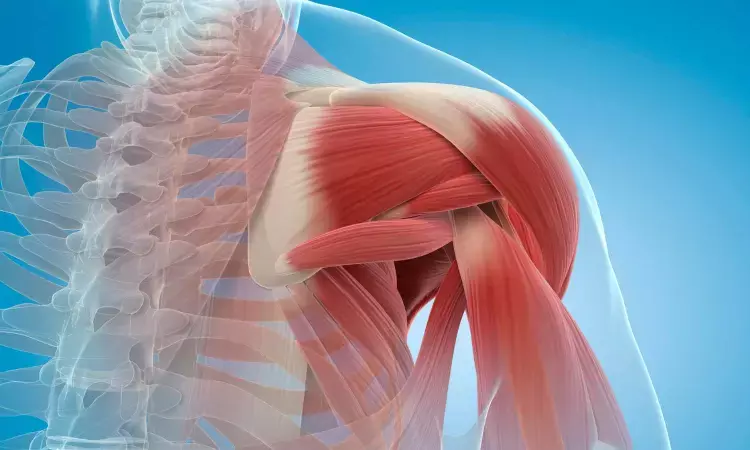- Home
- Medical news & Guidelines
- Anesthesiology
- Cardiology and CTVS
- Critical Care
- Dentistry
- Dermatology
- Diabetes and Endocrinology
- ENT
- Gastroenterology
- Medicine
- Nephrology
- Neurology
- Obstretics-Gynaecology
- Oncology
- Ophthalmology
- Orthopaedics
- Pediatrics-Neonatology
- Psychiatry
- Pulmonology
- Radiology
- Surgery
- Urology
- Laboratory Medicine
- Diet
- Nursing
- Paramedical
- Physiotherapy
- Health news
- Fact Check
- Bone Health Fact Check
- Brain Health Fact Check
- Cancer Related Fact Check
- Child Care Fact Check
- Dental and oral health fact check
- Diabetes and metabolic health fact check
- Diet and Nutrition Fact Check
- Eye and ENT Care Fact Check
- Fitness fact check
- Gut health fact check
- Heart health fact check
- Kidney health fact check
- Medical education fact check
- Men's health fact check
- Respiratory fact check
- Skin and hair care fact check
- Vaccine and Immunization fact check
- Women's health fact check
- AYUSH
- State News
- Andaman and Nicobar Islands
- Andhra Pradesh
- Arunachal Pradesh
- Assam
- Bihar
- Chandigarh
- Chattisgarh
- Dadra and Nagar Haveli
- Daman and Diu
- Delhi
- Goa
- Gujarat
- Haryana
- Himachal Pradesh
- Jammu & Kashmir
- Jharkhand
- Karnataka
- Kerala
- Ladakh
- Lakshadweep
- Madhya Pradesh
- Maharashtra
- Manipur
- Meghalaya
- Mizoram
- Nagaland
- Odisha
- Puducherry
- Punjab
- Rajasthan
- Sikkim
- Tamil Nadu
- Telangana
- Tripura
- Uttar Pradesh
- Uttrakhand
- West Bengal
- Medical Education
- Industry
Apitegromab improves motor function of patients with spinal muscular atrophy, reveals study

Spinal muscular atrophy (SMA) is a debilitating genetic disorder characterized by muscle weakness and degeneration that often leading to severe disability and shortened lifespan. A new therapy called apitegromab for patients revealed promising results in a recent phase 2 clinical trial published in the Neurology Journal.
Apitegromab is an investigational fully human monoclonal antibody that works by inhibiting myostatin that regulates skeletal muscle growth. Unlike the currently approved therapies for SMA that mainly focus on reversing degeneration, apitegromab targets the preservation of muscle mass to address the underlying impairment caused by neurodegeneration.
The phase 2 TOPAZ trial evaluated the safety and efficacy of apitegromab in individuals with later-onset type 2 and type 3 SMA. The study explored potential eligibility criteria and treatment regimens for future research that involved three cohorts of participants aged from 2 to 21 years. The trial was conducted across 16 sites in the United States and Europe that revealed promising results. 58 participants received apitegromab infusions every four weeks for 12 months. The primary efficacy measure using the Hammersmith Functional Motor Scale demonstrated improved motor function in participants across all cohorts.
The participants in cohort 3, who received apitegromab in combination with nusinersen showed the most significant improvement. At 12 months, the mean scores increased by 5.3 points for the 2-mg/kg arm and 7.1 points for the 20-mg/kg arm. Also, this therapy demonstrated a favorable safety profile with no deaths or serious adverse reactions reported.
These encouraging outcomes support the advancement of apitegromab into a randomized, placebo-controlled phase 3 trial for SMA patients. If successful, apitegromab could offer the much-needed treatment option that halts disease progression and further improves motor function by enhancing the quality of life for individuals living with SMA.
Source:
Crawford, T. O., Darras, B. T., Day, J. W., Dunaway Young, S., Duong, T., Nelson, L. L., Barrett, D., Song, G., Bilic, S., Cote, S., Sadanowicz, M., Iarrobino, R., Xu, T. J., O’Neil, J., Rossello, J., Place, A., Kertesz, N., Nomikos, G., & Chyung, Y. (2024). Safety and Efficacy of Apitegromab in Patients With Spinal Muscular Atrophy Types 2 and 3. In Neurology (Vol. 102, Issue 5). Ovid Technologies (Wolters Kluwer Health). https://doi.org/10.1212/wnl.0000000000209151
Neuroscience Masters graduate
Jacinthlyn Sylvia, a Neuroscience Master's graduate from Chennai has worked extensively in deciphering the neurobiology of cognition and motor control in aging. She also has spread-out exposure to Neurosurgery from her Bachelor’s. She is currently involved in active Neuro-Oncology research. She is an upcoming neuroscientist with a fiery passion for writing. Her news cover at Medical Dialogues feature recent discoveries and updates from the healthcare and biomedical research fields. She can be reached at editorial@medicaldialogues.in
Dr Kamal Kant Kohli-MBBS, DTCD- a chest specialist with more than 30 years of practice and a flair for writing clinical articles, Dr Kamal Kant Kohli joined Medical Dialogues as a Chief Editor of Medical News. Besides writing articles, as an editor, he proofreads and verifies all the medical content published on Medical Dialogues including those coming from journals, studies,medical conferences,guidelines etc. Email: drkohli@medicaldialogues.in. Contact no. 011-43720751


